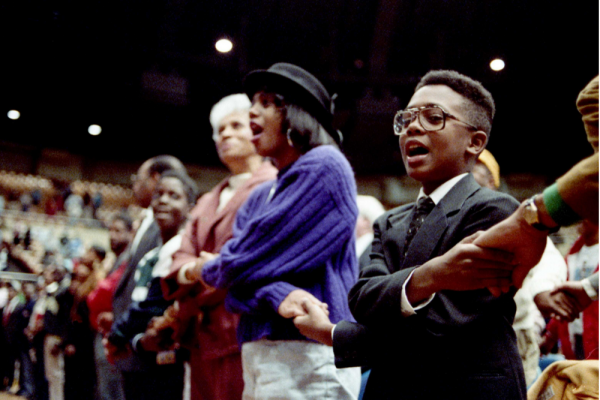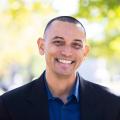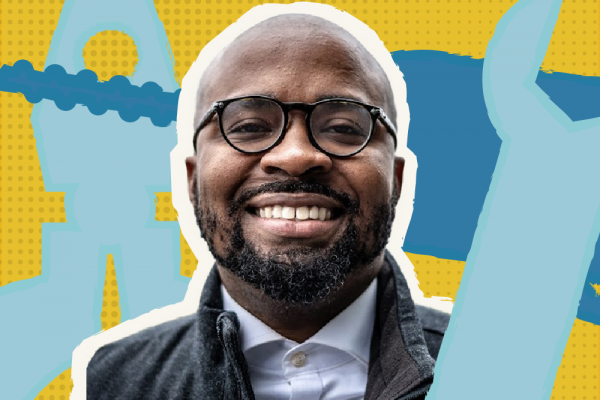I remember the flood of emotions I felt almost a year ago when I heard that the major news networks were calling the 2020 election results: overwhelming relief and renewed hope. Far beyond a victory for then-to-become President Joe Biden, it felt like a victory for our democracy — and an imperative to resuscitate, revitalize, and reinvent that democracy.
Fast forward a year: I’m filled with a festering weariness and escalating heartache.
My wife has challenged me to share more about my personal story and perspective, which is firmly rooted in my experience as an African American husband, father, and ordained minister. And with that lens, I want to be vulnerable: I am filled with righteous anger by the state of our union. I’m also deeply weary of the gaslighting — of being told that the growing attacks on our democracy are overblown or simply political theater. I am tired because I have seen my Black siblings bear the disproportionate brunt of violence, COVID-19 infections and deaths, poverty, discriminatory laws and practices, inequity in schools, health care, and housing. The list could go on.
One year ago, Black voters played a decisive role in voting out a president who didn’t believe that their lives fully mattered and who posed an existential threat to our nation’s democracy. We showed up. With our votes, we called for the end to systemic racism, including in the policing and criminal justice system. We called for real and lasting protections to voting rights and for economic policies that prioritize racial justice and equity. We called for what many have referred to as a third reconstruction.
But what have we heard in the year since then? A response of “no,” again and again, largely tied to infighting among Democrats and stonewalling from Republicans: “No” on the For the People Act and another “no” on the Freedom to Vote Act, sweeping bills that would have redressed the biggest problems facing our electoral process, including voter access, gerrymandering, and campaign finance. “No” on common sense and long-overdue reforms to our racialized and unjust policing system, much less the deeper transformation that is needed. “No” to a pathway to citizenship for our broken immigration system. And while I’m still determined we’ll pass the transformational and pro-family social spending bill known as the Build Back Better package, to date, we’ve only heard “no” on providing these much-needed resources for a community that has experienced neither equity nor equality.
Just yesterday, Senate Republicans used the filibuster to say no to the John Lewis Voting Rights Advancement Act — a tragic case of déjà vu since the same Senate procedural rule was used to block civil rights legislation for so many tortuous years during the ’50s and ’60s.
We’ve also seen the emergence of a new racist dog whistle: critical race theory. Despite scarce evidence that CRT — an academic concept that examines how racism is embedded in societal systems and structures — is even taught in Virgina public schools, Glenn Youngkin used it to stoke white voters’ fears, a strategy that helped galvanize the GOP base in his gubernatorial victory earlier this week. This is the latest mutation of the Southern Strategy, a Republican tactic used in the ’60s and ’70s to stoke feelings of racial grievance among white voters — and gain their political support.
In November 2020, we demanded bold change; instead, Black voters have been told over and over again that we must wait. Why have we been given this burden, this responsibility to continually redeem American democracy? Where are our white Christian siblings to carry the weight with us and be the kinds of allies that these times desperately call for? As I’ve written in my book A More Perfect Union, I’m convinced the road to a more perfect union must coincide with building a more perfect democracy and a radically more just and inclusive nation. That’s why the litanies of "no" we’ve heard this year are so heartbreaking.
On this one-year anniversary of the 2020 election, I am struggling to remember the feeling of unbridled optimism that we were turning a corner. I am not saying that major changes have not happened; we can celebrate good things, including the expansion of the Child Tax Credit, the end to a series of harmful policies such as the so-called “Muslim Ban,” and an increase in science-driven leadership in addressing the COVID-19 pandemic. But we need so much more. We need people of faith of all traditions to march towards justice. We need to be louder, more organized, more passionate than the people who want to turn things back. The democratic tools available to us in the U.S. are indispensable, but politics alone will not get us where we need to go. We need stronger movements and sustained action. There is absolutely nothing that sustains us more than our faith.
In watching and listening to virtual services for almost two years now, I have been reminded that church community is critical for driving and sustaining social justice movements. At Alfred Street Baptist Church, where my family attends and I'm active in ministry, as well as so many other historically Black churches, we are filled with the word when we are weary. In church, we can link arms with weary travelers on this long road of justice and march on together. We are filled with the hymns of our ancestors such as “Oh, Freedom” and “Don’t Let Nobody Turn You Around,” as well as contemporary praise and worship music that revives our spirit, reminding us to whom we belong and where to cast our eyes for hope. And we are sometimes filled with the righteous anger and courage that helps us demand our rightful seat and inclusion at the table, not just to be called upon every time our vote is needed.
I spent months in 2020 telling people of faith that their vote mattered and that this was the most consequential election in our lifetime. I still fervently believe that was true. But I now realize we need a revised message to break through the pain, anger, and cynicism that has seeped in and will metastasize without greater progress and hope.
I keep coming back to one of my favorite scriptures, from my favorite prophet, Isaiah: “That they that wait upon the Lord will renew their strength, they will mount up on wings as eagles, they shall run and not be weary, they shall walk and not faint” (Isaiah 40:31). Yes, this is a moment of weariness. But on the other side of weariness is hope-filled resilience, dogged persistence, and relentless resolve.
As a Black husband, a father of two Black sons, and ordained minister, I need my fellow sojourners — my siblings in faith across generations, political persuasions, and racial backgrounds — to find their own wells of resilience and press forward together to strengthen movement for transformation. I’m asking you to act more boldly, speak up more vigilantly, pray more fervently and to look for those who are also weary and lift them up.
And to my Black and brown siblings: I feel you, I see you, and I am praying for you and with you. I pray that we do what we have so often done in times of crisis and need: dig deeper, cheered on by the cloud of witnesses who have come before us, relying on our ever-abiding faith that the ultimate victory has already been won. We must press on.
Got something to say about what you're reading? We value your feedback!







